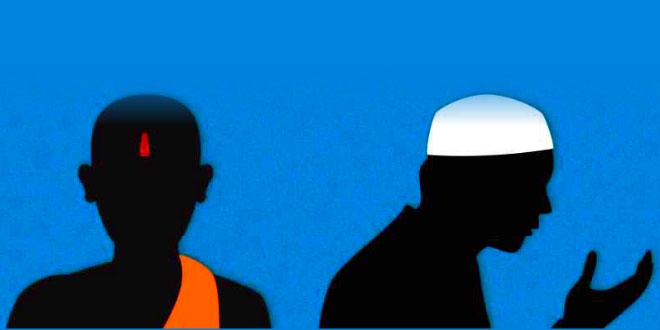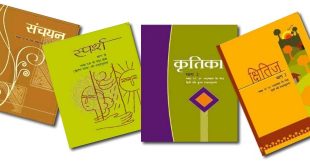Question: What is Communalism?
Answer: The term Communalism is widely used across South Asia to describe the systematic misuse of religion for political purposes. It represents the processes of political construction of community identities along religious lines. Communal politics represents one’s own religious community in an antagonistic relationship with ‘the other religious community.’ Socially engineered prejudice, tension and conflict between religious communities constitute communalism. Communalism Combat stands for equal respect to all religions and is opposed to the cynical manipulation of faith in the pursuit of power; therefore, we are opposed to both majority and minority communalism.
Question: Write a brief note on the Hindu caste system.
Answer: The Hindu caste system reflects Indian occupational and socially defined hierarchies. Ancient Sanskrit sources divide society into four major categories, priests or Brahmin, warriors or Kshatriya, traders or Vaishya and labourers or the Shudra. In addition to these castes we also have the “untouchables”.
The Indian society is divided into thousands of jatis, which are local groups based on occupation.
Despite economic modernization and laws countering discrimination against the lower end of the caste structure and outlawing “untouchables”, the caste system remains an important source of social identification and a potent factor in the political life of the country.
Question: What are the positive aspects of caste system in Indian politics?
Answer: The caste system plays different kinds of roles in politics. In some situations, expression of caste differences in politics gives many disadvantaged communities the space to demand their share of power. In this aspect caste politics has helped people from Dalits and Backward Castes to gain better access to decision making.
Several political and non-political organisations have been demanding and agitating for an end to discrimination against particular castes, for more dignity and more access to land, resources and opportunities.
Caste privilege and solidarity provide a kind of safety net. This will probably change as economic competition intensifies; but caste assertion largely precludes class solidarity.
Question: Mention different aspects of life in which women are discriminated or disadvantaged in India.
Answer: Family laws of all religions discriminate against women.
There are reports of various kinds of harassment, exploitation and violence against women. Urban areas have become particularly unsafe for women.
In India, the proportion of women in legislature has been very low. For example, the percentage of elected women members in Lok Sabha has never reached even 10 per cent of its total strength. Their share in the state assemblies is less than 5 per cent. In this respect, India is among the bottom group of nations in the world.
Question: State different forms of communal politics with one example each.
Answer: The most common expression of communalism is in everyday beliefs. These routinely involve religious prejudices, stereotypes of religious communities and belief in the superiority of one’s religion over other religions. This is so common that we often fail to notice it, even when we believe in it.
A communal mind often leads to a quest for political dominance of one’s own religious community. For those belonging to majority community, this takes the form of majoritarian dominance. For those belonging to the minority community, it can take the form of a desire to form a separate political unit.
Question: State how caste inequalities are still continuing in India.
Answer: Caste has not disappeared from contemporary India. Some of the older aspects of caste have persisted. Even now most people marry within their own caste or tribe. Untouchability has not ended completely, despite constitutional prohibition. Effects of centuries of advantages and disadvantages continue to be felt today. The caste groups that had access to education under the old system have done very well in acquiring modern education as well. Those groups that did not have access to education or were prohibited from acquiring it have naturally lagged behind. That is why there is a disproportionately large presence of ‘upper caste’ among the urban middle classes in our country. Caste continues to be closely linked to economic status.
Question: State two reasons to say that caste alone cannot determine election results in India.
Answer: When parties choose candidates in elections, they keep in mind the caste composition of the electorate and nominate candidates from different castes so as to muster necessary support to win elections. When governments are formed, political parties usually take care that representatives of different castes and tribes find a place in it.
Universal adult franchise and the principle of one-person-one-vote compelled political leaders to gear up to the task of mobilizing and securing political support. It also brought new consciousness among the people of castes that were hitherto treated as inferior and low.
Question: What is the status of women’s representation in India’s legislative bodies?
Answer: In India, the proportion of women in legislature has been very low. For example, the percentage of elected women members in Lok Sabha has never reached even 10 per cent of its total strength. Their share in the state assemblies is less than 5 per cent. In this respect, India is among the bottom group of nations in the world. India is behind the averages for several developing countries of Africa and Latin America. In the government, cabinets are largely all-male even when a woman becomes the Chief Minister or the Prime Minister.
Question: Mention any two constitutional provisions that make India a secular state.
Answer: There is no official religion for the Indian state. Unlike the status of Buddhism in Sri Lanka, that of Islam in Pakistan and that of Christianity in England, our Constitution does not give a special status to any religion.
The Constitution provides to all individuals and communities freedom to profess, practice and propagate any religion, or not to follow any.
 Class Notes NCERT Solutions for CBSE Students
Class Notes NCERT Solutions for CBSE Students





